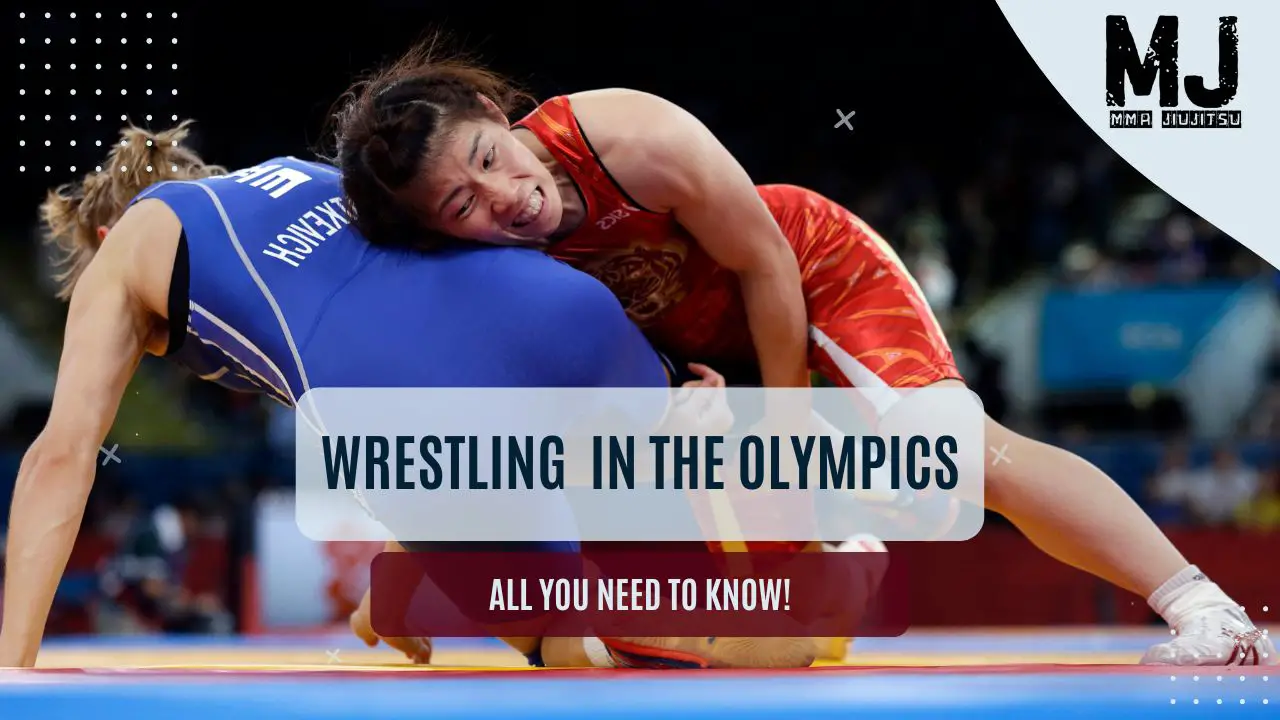Wrestling is one of the oldest athletic contests in the Olympics. It made its debut in 708 BCE during the ancient Games.
In the modern era, wrestling continues as a cornerstone of the Olympic Games, reflecting its enduring appeal and combative spirit. Stay tuned for more!
History of Wrestling in the Olympics
Ancient Olympic Games
Wrestling’s roots in the ancient Olympic Games highlight its long-standing significance.
Introduced in 708 BCE, wrestling was a central event, with competitions divided into “upright” and “ground” disciplines.
The sport was esteemed for its physical demands and its role in military training and education.
Victors were celebrated as symbols of strength and prowess, embodying the virtues of ancient Greek culture.
Modern Olympic Games
The revival of wrestling in the modern Olympic Games occurred in 1896 in Athens, where Greco-Roman wrestling was featured.
This discipline emphasizes strength and technique by restricting holds to the upper body.
Freestyle wrestling was introduced in the 1904 St. Louis Games. It offers a more dynamic and inclusive format that allows the use of legs and holds both above and below the waist.
Women’s freestyle wrestling joined the Olympic program in 2004 in Athens, marking a significant step towards gender equality in the sport.
These developments reflect wrestling’s evolution while maintaining its foundational principles.
Types of Wrestling in the Olympics
Freestyle Wrestling
Freestyle wrestling, a more modern iteration of the sport, permits athletes to use their entire body in offense and defense.
This style promotes versatility and innovation, as competitors can employ various techniques to secure takedowns and pins.
Countries like the United States, Russia, and Iran have excelled in freestyle wrestling.
They produce legendary athletes such as Jordan Burroughs and Abdulrashid Sadulaev, who have achieved remarkable success on the Olympic stage.
Greco-Roman Wrestling
Greco-Roman wrestling, rooted in ancient practices, limits competitors to using only their upper bodies to execute throws and holds.
This discipline emphasizes power, control, and precision, focusing on clinch work.
Historically dominated by nations like Russia, Hungary, and Cuba, Greco-Roman wrestling has seen icons such as Aleksandr Karelin, known for his unparalleled strength and dominance, winning three consecutive Olympic gold medals.
Women’s Wrestling
Women’s wrestling, introduced to the Olympics in 2004, follows the freestyle format and has rapidly grown in popularity.
Pioneers like Japan’s Saori Yoshida and Kaori Icho have set new standards, with Icho becoming the first woman to win gold in the same event at four consecutive Olympics.
This inclusion has enhanced the sport’s diversity and inspired a new generation of female wrestlers globally.
Notable Olympic Wrestling Moments
Historic Matches
The 1984 Los Angeles Olympics saw an unforgettable match where Jeff Blatnick, having overcome cancer, won gold in Greco-Roman wrestling, symbolizing triumph over adversity.
Another historic bout was the 2000 Sydney Games when Rulon Gardner defeated the legendary Aleksandr Karelin. This ended Karelin’s 13-year unbeaten streak and secured one of the biggest upsets in Olympic history.
Legendary Wrestlers
The Olympics have celebrated numerous wrestling legends.
With his dominance in Greco-Roman wrestling, Aleksandr Karelin won three gold medals from 1988 to 1996.
Another icon is the Japan’s Kaori Icho. She made history by winning gold in women’s freestyle wrestling at four consecutive Olympics from 2004 to 2016, showcasing remarkable consistency and skill.
Impact of Wrestling in the Olympics
Influence on Global Wrestling
Olympic wrestling has been crucial in promoting and developing the sport worldwide.
The Olympics’ visibility and prestige have inspired countless athletes and led to increased investment in wrestling programs globally.
This has elevated the level of competition and fostered the emergence of new wrestling powerhouses, contributing to the sport’s dynamic evolution.
Inspirational Stories
The Olympics have been a stage for inspiring stories of resilience and determination.
Rulon Gardner’s victory over Aleksandr Karelin in 2000 is a prime example, highlighting the unpredictable nature of sports and the power of perseverance.
Similarly, Helen Maroulis’s triumph over three-time Olympic champion Saori Yoshida in 2016 demonstrated the rise of new talent and the shifting dynamics in women’s wrestling.
Wrestling’s Cultural Significance
Wrestling holds profound cultural significance in many countries.
In Iran, it symbolizes national pride and heroism, while in Japan, the success of female wrestlers has significantly advanced gender equality in sports.
These cultural connections enhance the sport’s appeal and foster a deep sense of identity and tradition among wrestlers and fans.
Challenges and Controversies
Changes in Olympic Wrestling
Wrestling has faced challenges, including evolving rules to make the sport more engaging for audiences.
These changes, such as modifying scoring systems and match durations, have sparked debates but are essential for the sport’s modernization and broader appeal.
Controversies
The most significant controversy occurred in 2013 when the IOC decided to drop wrestling from the 2020 Olympics, citing a need to modernize the Games.
The decision prompted a global outcry and led to significant reforms within the sport, including rule changes and adding more women’s weight classes.
These efforts successfully reinstated wrestling in the Olympics, underscoring the sport’s resilience and importance.
Future of Wrestling in the Olympics
Prospects for Upcoming Games
The future of wrestling in the Olympics looks bright, with emerging talents from diverse regions poised to make their mark.
The 2024 Paris Olympics will likely feature thrilling matches and new stars, continuing the sport’s tradition of excellence and innovation.
Evolution of the Sport
Technological advancements and modern training methods are transforming wrestling.
Innovations such as video analysis and advanced sports science enhance athlete performance, while grassroots programs are crucial for developing future champions.
These developments ensure wrestling’s continued evolution and relevance in the Olympic Games.
Conclusion
The enduring presence of wrestling in the Olympics is a testament to its universal appeal and historical significance.
From its ancient origins to its modern iterations, wrestling embodies the Olympic spirit of excellence, resilience, and sportsmanship.
As the sport continues to evolve and inspire, its legacy within the Olympic movement remains secure. This promises exciting future chapters in wrestling’s storied history.



